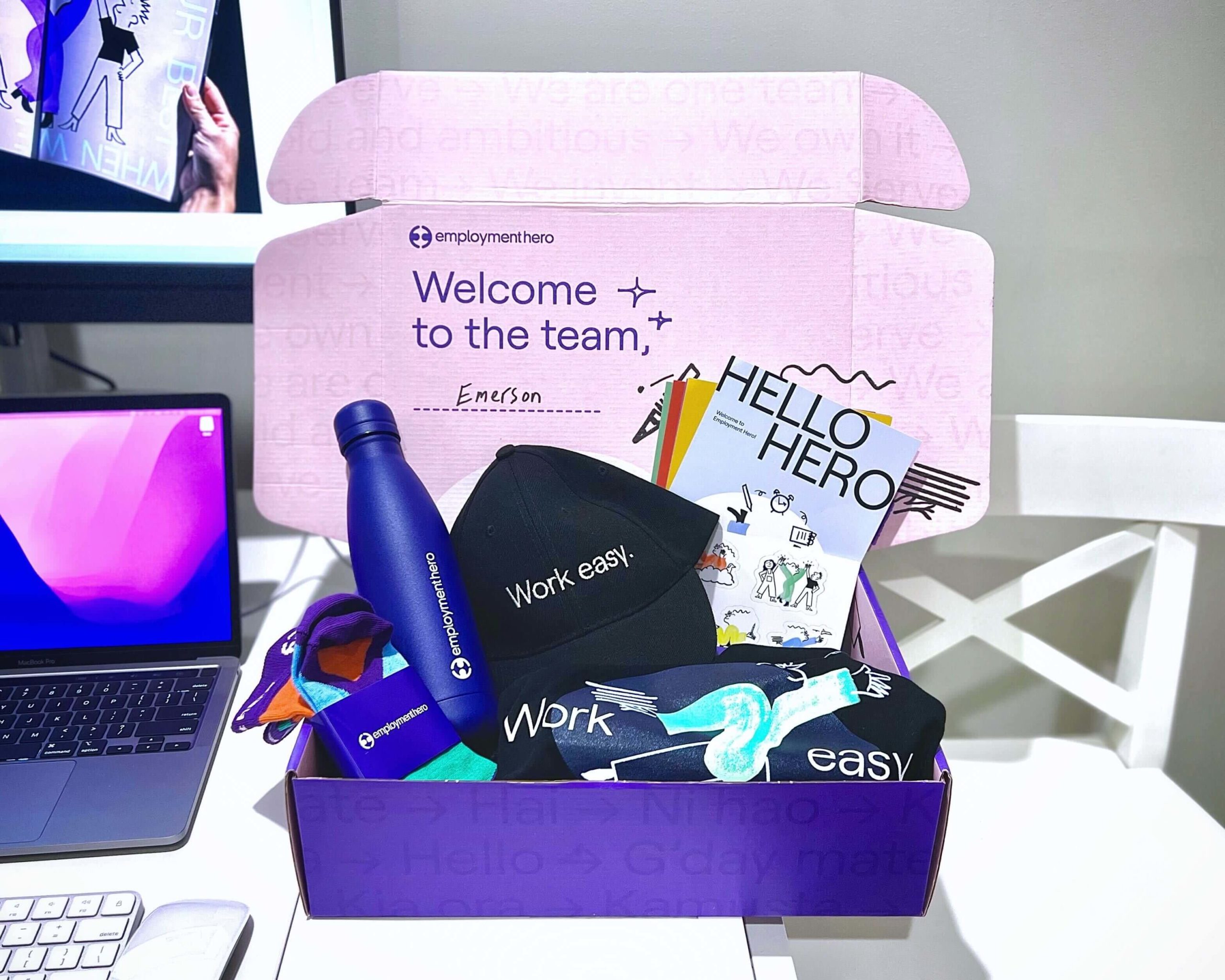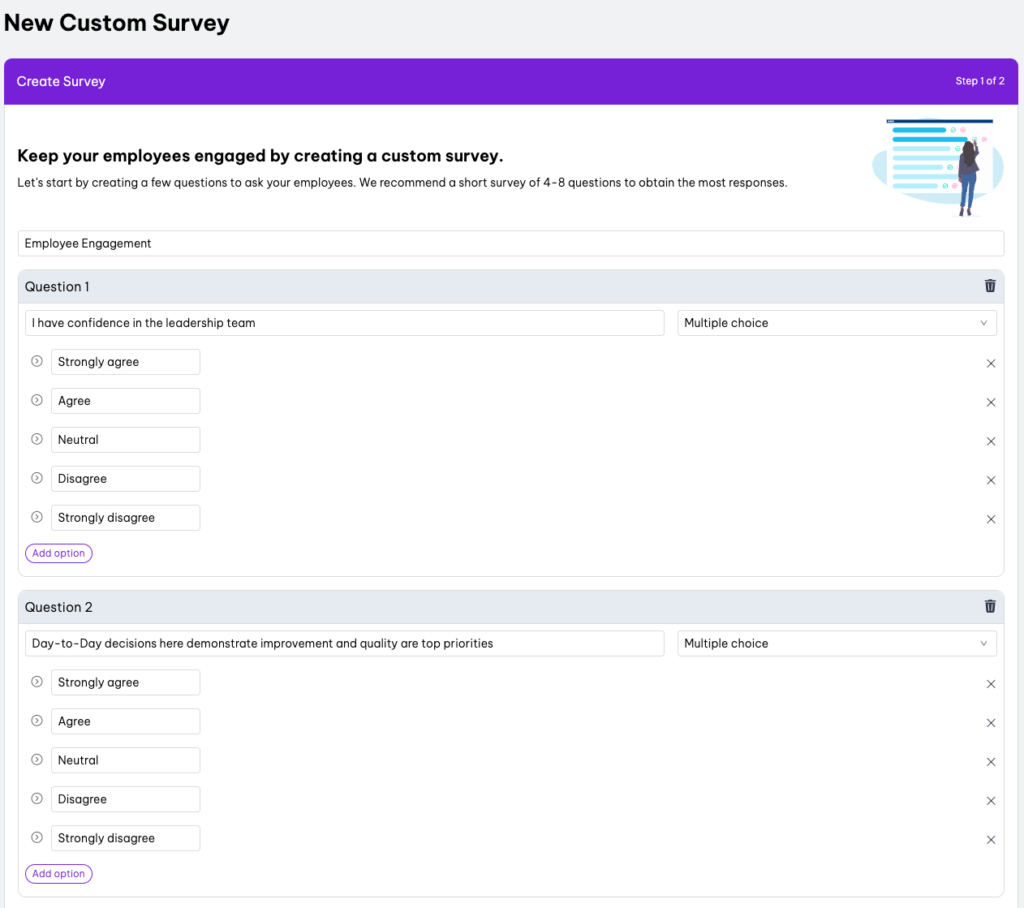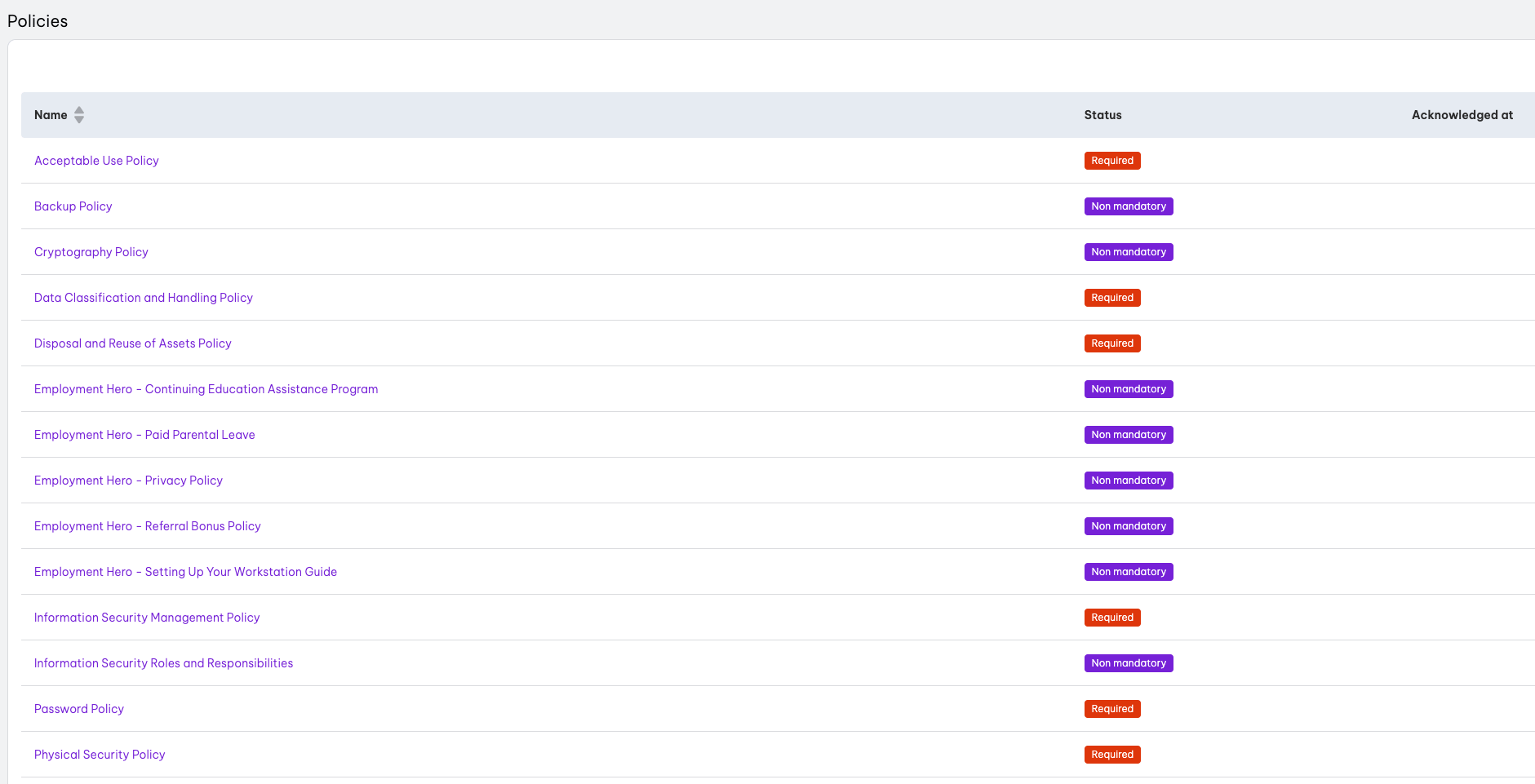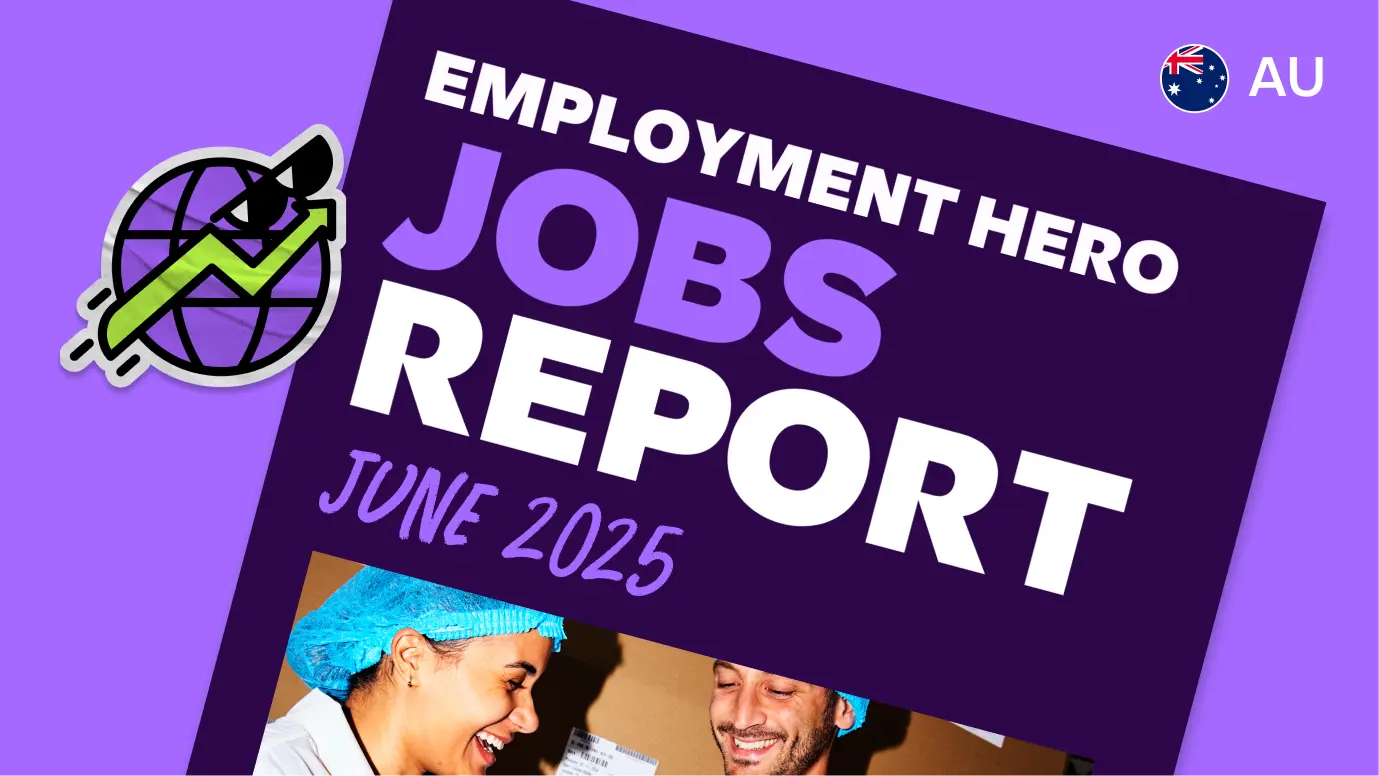The ultimate employee onboarding and induction guide
Published
The ultimate employee onboarding and induction guide
Growing a business is hard, and finding the right people to help grow your business is even harder. So, when you’ve found exceptional talent for your business and you’re ready to welcome your new team member, how can you make their first impression a great one?
How can you give new hires an onboarding and induction experience they’ll remember for all the right reasons?
The answer? A stellar onboarding process that makes new hires feel like they belong, even before their first day.

What’s in this new employee onboarding guide?
This ultimate guide to employee onboarding will show you the best practices in creating a great employee onboarding process and will cover:
- The ins and outs of an effective employee onboarding process
- Common mistakes in onboarding programs to watch out for
- How to ensure new employees stick around
- How to showcase your company culture
- Tips to get prepared for your new hires
- A new employee onboarding checklist
- How to manage probation periods
Download The Ultimate Employee Onboarding and Induction Guide now.
What is an employee onboarding process?
Onboarding is often an underrated part of the employment process, but it’s a critical one. An onboarding process — good or bad — can set the tone for your new employee’s career with your business. It has the potential to fast-track a person’s transition into a business, or slow it way down.
All of this is to say, there are a few core goals to consider regarding your onboarding process:
- Kick-starting employee engagement; your new hires should feel that the business is invested in their success, they should have a good understanding of the business’ values and company mission — and how they can contribute.
- Practical administrative support; your people shouldn’t be wasting time filling out endless new hire paperwork or setting up — a good onboarding process will have these practicalities sorted beyond the start date.
- Instilling workplace culture; having a sense of belonging is crucial for new hires to do their best work — they need to feel empowered around relationship building and team camaraderie from day one.
With three essential goals of onboarding to manage, you’ll need a great onboarding process to make sure everything’s covered. This free guide can help you establish just that.
Read more: Employee Induction and Onboarding Checklist Template
What is the difference between induction and onboarding in HR?

What’s an induction?
Induction is typically a shorter and more focused process that occurs immediately after an employee joins the organisation. The primary goal of induction is to provide new employees with basic information and essentials they need to start working effectively. It is a brief introduction to the company, its policies and the immediate work environment. The key features of induction include:
- Introduction to the company’s mission, vision, and values.
- An overview of company policies, rules, and regulations.
- Introduction to the workplace and essential facilities.
- Basic information about employee benefits and perks.
- Completion of essential paperwork and formalities, such as tax forms and employment contracts.
What’s onboarding?
Onboarding, on the other hand, is a more comprehensive and extended process that takes place over weeks or months. It is designed to help new employees assimilate into the company culture, understand their roles in depth and establish relationships within the organisation. The main objectives of onboarding are:
- Introducing new employees to their teams, colleagues and supervisors.
- Providing a deeper understanding of the company’s structure, processes and goals.
- Facilitating the development of job-specific skills and knowledge.
- Clarifying performance expectations and setting goals.
- Offering ongoing support and guidance to ensure a smooth transition into the new role.
- Address any questions or concerns the new employee may have.
Why is a good onboarding experience important?

What do the best onboarding programs from the world’s leading companies have in common? They all reap these amazing benefits. But why should only big companies enjoy these? Our guide can help companies of all sizes enjoy these great results.
1. It can set new hires up for success from their first day
Your new team members can say farewell to the first day jitters. An effective employee onboarding process will help make sure that new hires are feeling happy and productive from their first day on the job.
The most successful onboarding programs are supported by great communication with new hires before their first day, to make sure that they have everything they need in the lead-up. This way, they can embrace everything about your business from day one – with no time lost to admin or confusion.
2. It can help you collect essential information about your new hire
When you’re following a structured onboarding process, there’s no need to fear that you’ve missed out on acquiring important information from your new employees.
An onboarding checklist (like the one in this guide), will make sure that you collect all necessary payroll, HR and personal information. Whether you’re doing this manually or with the help of an HRIS — you can be confident that you have everything you need to employ your new person compliantly.
Read more: Your complete guide to taking HR digital
3. It can help you communicate essential information to your new hire
On the flip side, an effective onboarding process can also help your employees receive all the important information that they need.
Whether it’s communicating company policies, an employee handbook, dress code information or the details of an onboarding buddy – it all happens in the onboarding process.
4. It can help your new employee understand your company mission and values
What powers your team, and your whole business, towards success?
It’s not the break room coffee (although that can really help), it’s your company’s mission and values. And these should be communicated to your new hires from day one.
Sharing your mission and values with new employees won’t only motivate them and have them eager to get started — it will also make sure that their work will be immediately aligned with the company’s goals.
5. It’s a powerful motivational tool
Sharing your company values and mission aren’t the only things that can get your new hire feeling excited and ready to hit the ground running.
During onboarding, many teams also show their new hires the great work they’ve been producing lately, or share the details of exciting projects coming up. It’s onboarding processes like this that can get your new employees excited about their contribution.
6. It can help new hires feel like they belong
A study from BetterUp found that workplace belonging can lead to an estimated 56% increase in performance, a 50% reduced risk of turnover and a 75% drop in sick days. With stats like these, why wouldn’t you prioritise belonging from day one?
No one likes to be the new person, but a positive onboarding experience can do a lot to help your new hire feel welcomed and part of a team. It’s an essential time for building relationships and creating a united work environment.
7. It can get new hires acclimated to their new role and key responsibilities
A job description can only do so much. New employees need to understand not only what their job entails, but how it fits into the larger picture of the entire company.
Onboarding is the perfect opportunity to give new employees a bird’s eye view of their department, how it works with other departments and what the company’s overarching goals are.
8. It can improve employee satisfaction and put them on the path to long-term success
When new employees feel supported and valued, they are less likely to look for other opportunities.
Foundations are everything, right? To feel valued within a business, you need to feel like you’re being invested in from day one. This all starts with onboarding. The experience that your new hire has during their first week can put them on a path to long-term success at your company.
Common employee induction and onboarding mistakes to avoid
So what are the key mistakes every employer should avoid during the employee induction process and when introducing a new staff member into the team?
Providing a great first impression to a new starter is vital for your business – it ensures a low staff turnover rate and overall higher employee satisfaction, engagement and wellbeing.
That’s why I’m here to tell you all the BIG employee onboarding and company induction mistakes I’ve seen over the years, so you don’t make them when the time comes.
Mistake #1. Not following up with a new starter in the lead up to their first day
You don’t need to pester your new hire every day until they start with countdown-like announcements – but checking in a few days before their first day just to remind them of anything important they might need to bring, or giving them a run through of how the day will go might help them feel more at ease.
Mistake #2. Not being prepared for your employee induction
Always be prepared. If someone is coming to start a new job, it’s your responsibility to make sure they have everything they need to get up and running as quickly and seamlessly as possible.
This includes;
- Any uniform they might need
- Equipment such as laptops, safety equipment, tools etc
- Login details or access codes to different company systems
Remember, it’s all about setting a good first impression so another tip is to make sure all the equipment you have given them actually works.
For a well-designed online induction program, check out how to create a killer induction program.
Mistake #3. Overloading your new starter with information
Don’t overwhelm your new starter with too much information. This could result in them feeling disheartened and that they’re not a good fit for the role.
Instead of having a full-on induction day, why not try an induction week? So that your new starter has plenty of time to learn the ropes at their own pace.
Mistake #4. Handing them a mountain of paperwork
The classic mountain of paperwork imagery that we all know and love is back… but it’s still as true as ever. No new employee wants to start off their new career with a large amount of paperwork to sieve through.
This is where our paperless onboarding solution can help you eliminate this stack of paperwork for your new starters – recruiting, onboarding, and managing employees can be done 100% digitally with our cloud based hr software.
Mistake #5. Impersonal experiences during employee induction
Make your new employees feel like one of the team, not just another number to the business payroll.
Think outside the box for ways you can personalise their induction process into your business. Whether that’s a welcome pack on their desk, a name card hanging in their work station or a friendly email to the rest of the workforce introducing them to the business.
Mistake #6. Not introducing them to the team or wider company
This leads us nicely onto our next mistake that’s all too common. Mistake number 6 is not introducing your new starter to the team and wider business.
You want them to feel at home as soon as possible, so make sure everyone knows who they are, why they are there and that they are welcomed.
Mistake #7. Assuming your new starter knows the lingo
Your team might not be using universal or industry-specific language, so you shouldn’t assume that your new starter knows what you’re talking about.
If you regularly abbreviate words or use acronyms a lot in your day-to-day duties, try and remember to explain them. Or, why not go that extra step for your new starters by creating a cheat sheet or glossary?
Mistake #8. Not asking for feedback
Feedback is key for any growing business, and this is the same as growing your people. Don’t bombard them with feedback questionnaires on their first day.
We suggest sending them a few brief questions at the end of their employee induction process and again at the end of their probation to get some honest feedback about how they found the process.
Here’s some great tips on getting honest employee feedback from your workforce.
Mistake #9. Responsibilities are not clear
If the new starter finishes the new employee induction or onboarding process without knowing their main responsibilities of the new role, something wasn’t made clear to them. And that fault is on you.
You want them to have a firm understanding of how the team operates, how their role fits into that and what their key goals will be throughout their time at the company.
Mistake #10. You stop training
Just because the HR induction process is over, don’t stop supporting your new employee with their professional development.
Make sure there’s always a way for them to learn more information – whether that’s about the company or specific to their job role.
To do this successfully, it’s recommended you get a good idea of their goals from the start and then you can schedule regular catch-ups with them and their working manager for a progress report.
How to create an employee onboarding program

Workspace
- Prepare your new employee’s work area and office space and equip it with supplies.
- Order appropriate access keys/security cards and make sure they work.
- Order business cards, if applicable.
- Arrange for parking, if required.
- Send out any equipment and technology for remote employees via a courier.
- Give them details about any remote working allowances.
Technology access
- Order technology equipment (computer, iPad, phone) and software.
- Set up their system in advance and assign them to a printer.
- Arrange for access to common drives.
- Add their name to relevant email lists.
General communications
- Share the news about the new starter with everyone in the business so everyone’s ready for their introduction. It’s a good idea to share something personal about your new hire such as their love of coffee or their favourite footy team. In this way, other employees have something they can use to break the ice with them when they meet.
- Assign a buddy or mentor the new hire can rely on to show them the ropes and answer their questions, even show them the best place to grab lunch.
First day
- Have a small gift waiting for them such as your company t-shirt, mug or keychain.
- Give them a tour of the office or workplace and introduce them to key team members.
- If you haven’t already given them an onboarding pack before they started, make sure you present it on their first day, and give them time to complete the paperwork over the week ahead.
- Meet with them and their manager to explain the expectations of their role. The new starter needs to know what they’re supposed to be doing, and how that contributes to the company bottom line.
- Have their manager assign any simple tasks.
- Take them out for lunch with their manager and buddy or mentor.
First Week:
- Introduce them to employees from different areas of the business and have them shadow them so they can experience the business from many different aspects.
- Meet to check they’ve signed the paperwork and have accessed, read, and acknowledged your company policies.
- Check-in with them and their manager regarding any first tasks.
- Have their manager assign them their first project.
First Month:
- Hold regular check-in meetings and evaluate their progress after a month in the company.
- See how they’re getting along with the rest of the team and whether they’re enjoying their work.
- Assess and action training needs.
There you have it! An onboarding checklist to keep in your back pocket for when you have new employees starting in your business. Remember, first impressions count.
What are some common pain points of onboarding for SMEs?
Small to medium-sized enterprises (SMEs) often run into similar challenges when onboarding their new team members. Let’s unpack some of the most common issues before we jump into our actionable steps that can help you improve your onboarding process for good.
1. Paperwork takes up too much time
There’s nothing less inspiring as a new employee than arriving at your workplace, full of first day energy and enthusiasm, only to find yourself neck-deep in paperwork. Not only can this kill the excitement, completing paperwork on a first day when it could have been managed prior is not an effective approach.
You know you have this problem if; your new team members are spending hours completing and sourcing information on their first day, and appearing confused or disengaged around piles of paperwork.
2. Onboarding program elements are managed by too many people
When it comes to a new hire’s onboarding, who’s managing their administration? Who’s booking a team lunch? Who’s introducing them to senior leaders and who’s managing their key priorities? Effective work is all about delegation, but too many cooks working to an unstructured plan can quickly see things go haywire.
You know you have this problem if; your new employees seem unsure who they should direct their questions to, or they don’t seem to know who’s who in the team. They also might miss a critical part of the process because it’s being managed by someone who hasn’t had a proper briefing.
3. There’s not enough time to make a great first impression
When we onboard new talent, we have to balance their introduction to a business with all of our other priorities and deadlines. If there’s one thing we know for sure – it’s that onboarding takes time. It can be very challenging for a hiring manager to give their new hires the attention they need, but without it – their first few weeks could be chaotic.
You know you have this problem if; new hires at your business seem to be trying to navigate things on their own, or if your hiring managers can’t report back on how the new employee is progressing due to existing high-priority projects.
4. Your onboarding process is hard to update or develop
For growing SMEs, it’s important to recognise that onboarding – along with your other business processes – should always be evolving.
What worked for you when you had five employees probably won’t be as effective once you have 20 employees. If you’re finding it hard to solicit feedback or embrace modern technology, you’ll quickly run into more problems with this essential process.
You know you have this problem if; you’re still relying on outdated tools like paper policies and snail mail. Your program and management style has remained unchanged, you’ve outgrown your current systems and you haven’t sought feedback to improve your employee onboarding process.
5. Employees are feeling overwhelmed at the end of onboarding
With so much information to take onboard, a new workplace to navigate and a new culture to dive into – it’s no wonder that many employees finish their onboarding process feeling overwhelmed.
This feeling of bombardment can impact new hire productivity and initial job satisfaction, making it more challenging for employees to feel confident in their role.
You know you have this problem if; your employees are sporting glazed-over looks at the end of their first week, or they seem exhausted and confused when you ask them about their experience so far.
Best practices for starting or improving your employee onboarding experience
So what makes an onboarding experience positive or not? Let’s look at the best practices
1. Make them feel supported
From the moment a new employee accepts their job offer you need to make them feel informed and empowered. This means regular and effective communication every step of the way to get them up and running smoothly.
2. Get the administrative tasks out the way
Ensure all the necessary paperwork (e.g. providing personal and payroll information, logging certifications, acknowledging policies and signing contracts) is sorted prior to their start date so they can focus on getting acclimatised to their new role.
3. Embed them in slowly
Make them feel welcome into the company and team, and ensure there’s a good mix of learning and one on one time. During this induction, the new team member should ideally feel inspired and motivated by the company’s values and mission.
A proactive approach will see onboarding reach beyond day one. The first week and the first month should still have plenty of learning opportunities, getting-to-know you sessions and knowledge sharing. The entire experience should wrap up around 30 days in.
4. Have a welcome pack
A well-designed welcome pack can enhance the onboarding experience, making new hires feel valued from day one. Discover 10 welcome pack ideas to make your new employees feel special.
5. Regularly review your onboarding process
You’re always looking for better ways to run your business, and your onboarding process needs to be part of those considerations.
Track the positive impact of your onboarding over time; do new hires seem to be embracing the business and their roles, resulting in great productivity, minimal absenteeism and a good rate of new hire retention? There are plenty of people analytics you can use to get a better sense of the employee experience within your business.
From the data and feedback that you collect, you can start to make tweaks to optimise your process. We recommend reviewing your process annually or biannually to make sure that the experience is evolving at the same rate as your business.
6. Get feedback with anonymous surveys
If you’re unsure on how to best collect feedback to review your onboarding process, we have a simple solution. Ask your new hires.
How can you make sure that you’re getting honest responses? Issue an anonymous survey. This is your best way to source feedback that will be properly actionable. With Employment Hero’s anonymous survey feature, you can collect actionable data quickly and easily. Your employees can fill out their survey on the desktop or mobile app, delivering you results in one centralised location.
What questions should you consider asking? Here are a few of our favourites to get you started…
- On a scale of 1-10, how satisfied are you with your onboarding experience?
- Did you feel like you were given all of the tools and information to embrace your new job effectively?
- Did you feel like you were properly introduced to our company culture?
- Did you feel welcomed by your teammates and the business’ HR leaders?
- Do you feel inspired to pursue career development with us based on your onboarding experience?
- If you were to design the process, is there anything you would change when onboarding employees?
- Are there any onboarding practices you remember fondly from old workplaces? What were they and why did you like them?

7. Automate the employee onboarding process
Functionality that’s changing the way businesses think about employee onboarding admin is automation, enabled through automated hr systems (like Employment Hero). Automation creates a new onboarding process flow that can relieve HR teams from admin and reduce human error. Most importantly – it gives your team valuable time back to focus on welcoming your new hire.
At its core, automation alleviates the headache of organising and completing new hire paperwork. It works by triggering a series of actions when you enter a new employee into the system. When your employee accepts their job offer, they will be sent a link to create an employee profile on the platform.
From there, they can access their digital employment contract which will be stored on-platform, and be able to begin uploading their personal HR and payroll information. They’ll also be instantly assigned policies, training and more. All information is then stored securely on the employee onboarding platform.


8. Create a central source of truth
Remember that ‘too many cooks’ pain point we spoke about earlier? The reality is, great onboarding programs will require a team effort. But, to avoid the chaos and make the most of everyone’s time, you need to create a structured program located in a central source of truth.
What does it mean to have a central source of truth? Well, this generally refers to having one location where important information is stored and updated.
Everyone working on a project (which, in this case, is welcoming a new employee) can see the status of tasks and communicate updates or flag important details. With everyone having full visibility over the same process, your team can easily avoid the double-handling of tasks and make sure that nothing is missed.
You can create a centralised source of truth on cloud-based documents, but we definitely prefer using a HRIS (human resources information system). With our smart, cloud-based software, the involved members of your team can be assigned relevant checklist tasks, look at due dates and have visibility over a new employee’s entire onboarding process.

9. Start your employees mid-week
This is one of our favourite onboarding hacks at Employment Hero. Start your new hire on a Wednesday.
This incredibly simple change to an onboarding program can make a big difference to your team and your new hires. By doing this, you reduce the risk of overwhelming your new team members by limiting their information intake to three days and giving them the weekend to digest everything they’ve learned.
You also help your existing team by giving them time early in the week to dedicate to important tasks, with the second half of the week cleared for supporting new employees.
Give this easy hack a try and watch several onboarding pain points melt away! It’s definitely worked for us.

What role does an onboarding software play in successful onboarding?

We can’t speak for other software! But here’s the breakdown of how Employment Hero can help. Our HRIS system offers:
- Certifications
- Digital contracts
- Induction content
- Organisational charts
- Paperless onboarding
- Employee self-service
- Onboarding checklists
- Seamless induction tools
- Secure policies and policy tracking
But it’s not just the onboarding process tools our platform offers. It’s the ROI — 85% of business leaders agree: Employment Hero makes managing employment easier.
Looking for more onboarding resources?
Maybe the Ultimate Guide to Onboarding is not quite what you need right now, or you’re looking for other helpful tips for onboarding and recruitment. Here are some highlights from the Employment Hero resource hub.
Download our guide and seamlessly welcome new employees

At Employment Hero, it’s our mission to make employment easier and more valuable for everyone. Beyond the recruitment process, onboarding is your new hire’s most important interaction with the business.
Employment experts built Employment Hero specifically for small to medium-sized businesses. We identified that SMBs often don’t have the tools to make tasks like onboarding into a streamlined and effective experience for their new hires, while big businesses with big software systems reaped the benefits. Seamless onboarding leads to better employee retention and we all know how important that is.
That’s why onboarding software is a key feature of our product for SMBs. We want to help you reduce the time and effort it takes for you to successfully run your onboarding process, paperwork and admin — and as a result, save time and money!
Download The Ultimate Employee Onboarding and Induction Guide now.
Other helpful resources:
Related Resources
-
 Read more: Hire like a Hero: How to Source and Engage Top Talent
Read more: Hire like a Hero: How to Source and Engage Top TalentHire like a Hero: How to Source and Engage Top Talent
Join us to explore hiring strategies and tools that work. Get practical advice to attract top talent, streamline hiring, and…
-
 Read more: 5 Reasons You’re Not Landing the Job And What Experts Say You Should Do Instead
Read more: 5 Reasons You’re Not Landing the Job And What Experts Say You Should Do Instead5 Reasons You’re Not Landing the Job And What Experts Say You Should Do Instead
Published If you’ve got the right experience and real impact stories to tell but you’re still not landing the role,…




















